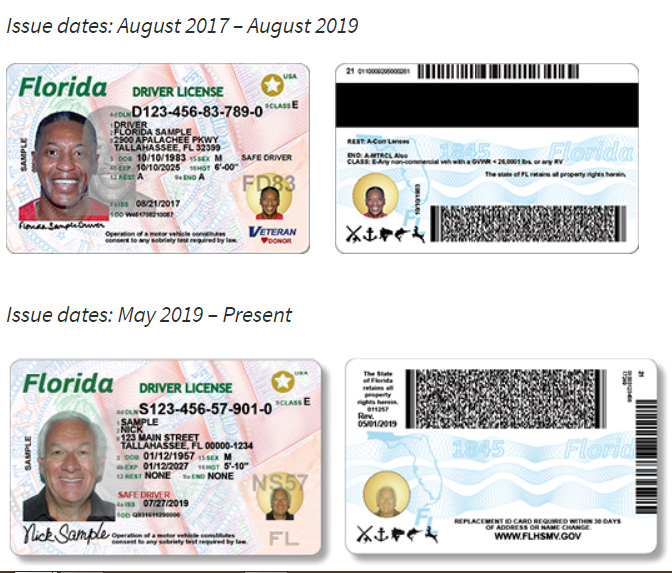

Immigrants renewing, replacing, or applying for a new driver's license or ID card in person must submit the following documents before a REAL ID-compliant driver license or ID card can be issued. If you don't receive mail due to living with someone, bring two address documents in that person’s name along with a notarized Certification of Address Form.Deed, mortgage, payment booklet, or rental agreement.Residential Address (not post office box).*Please make sure the name on your social security document matches the name you have or wish to have on your Driver's License*
Florida state drivers license check full#
Paycheck showing number (Showing full Social Security Number).Social Security card or W-2 form (Showing full Social Security Number).Original or certified copy of all marriage certificates or court orders that show your name change(s) (Uncertified photocopies are not valid.).Name Change: (if applicable) (Marriage constitutes name change) Certified US birth certificate (Not Hospital Birth Certificate).For more document options, visit What to BringĪn original or certified copy of one of the following documents: The checklists here list some valid documents. Therefore, it is important to hire a lawyer who specializes in this area of law to fight the ticket and make sure that you aren't unjustly penalized for an offense.For office visits, you must bring specific forms of proof for identification, Social Security number, and residential address. How information is shared between the states is still being formulated and the laws can change. If you were visiting outside your home state and received a citation for a traffic offense, you may be facing the same penalties as if the violation occurred in the state where you reside. It's possible in the near future that the DLC will be replaced with the Driver's License Agreement (DLA), which currently has only three member states (Arkansas, Connecticut and Massachusetts). They are also a member of the Non-Resident Violator Compact (NRVC), which requires member states to suspend the driver's license of individuals who are cited with a moving violation in another state. The State of Massachusetts chooses to share information through the Registry of Motor Vehicles (RMV), rather than through the DLC. The five states that do not share driving records include:Īlthough these states are not members of the DLC, they may be share information with other states through a different type of agreement. There are currently a total of 45 states and the District of Columbia that are members of the Interstate Driver's License Compact. That means that you will not be held liable for the offense because your home state does not recognize this law. Washington reports the offense to your home state of New Mexico that has no such ban. You are cited for using a hand-held cell phone. Let's say that you are visiting in Washington State where it is illegal for any driver to use a cell phone unless it is a hands-free device. For example, some states have made it illegal for motorists to use a hand-held cell phone while operating their vehicle. A person who is charged with a driving offense in a state where they do not reside cannot be held accountable if their home state does not have the same law.


The primary purpose of the DLC is to have one driver with one license and only one record. When an individual is convicted of driving on a suspended license, they could simply move to another state and apply for a license there without facing the penalties for the offense. The state where they reside will punish the offense as if it happened in the home state of the driver. If a non-resident commits a traffic offense, such as driving under the influence, this will be reported to the state where they currently hold a valid driver's license. The penalties for the offense may vary, and only be punished if the home state recognizes the equivalent law. Each member state will report the offense to the driver's home state. The Driver's License Compact (DLC) is an interstate agreement used by states to exchange information regarding traffic violations and license suspensions.


 0 kommentar(er)
0 kommentar(er)
